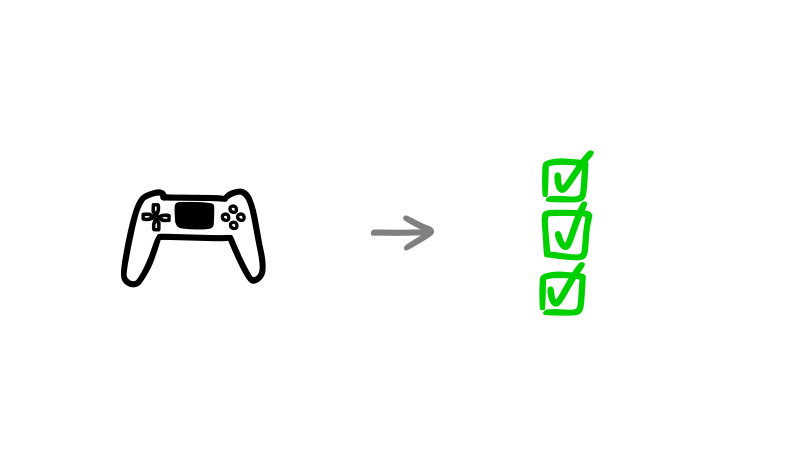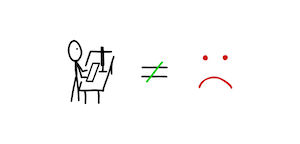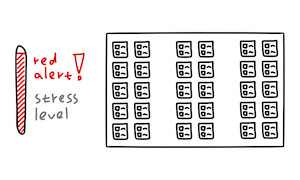Play the ultimate game: your real life

What makes games fun? What prevents them from becoming boring?
Steadily increasing difficulty.
When you play something that is too easy, you figure it out, or you use cheat codes, it gets boring quickly.
That’s why the most successful (and addictive) games are competitive multiplayers: League of Legends, DOTA 2, Starcraft 2, Fortnite, FPS...
Because of their player matchmaking system, they never get easy. You always play against players that possess similar levels of skills so you’re never bored. You’re engaged and on the edge of your chair.
Switch to playing the most satisfying game ever
What if we told you that there is a game:
- Where you never have to get bored
- Where you can always increase the difficulty
- Where you can always level up your skills and with each level up you’re liked more (and after you reach a certain level also admired)
- That has the best graphics out there
- Where everyone begins at different difficulty but everyone can improve
- Playing it and getting better brings real and everyday satisfaction
Let’s call this the ultimate game: your real life.
Transferring concepts from games to real life can be beneficial to all gamers, both to those who game without any issues and to those who are addicted to gaming.
If you don’t have any troubles with gaming, simply think about your life as a game and it can help you to develop more grit, perseverance, and other desirable real-life skills.
If you struggle with gaming too much, playing the ultimate game can help you overcome your addiction by building a more interesting life. This will help you recover from your addiction and maybe allow you to game in moderation in the future.
One way how gamers realize that they’re not addicted to gaming anymore is when their life gets interesting and they start to understand the opportunity costs connected to gaming obsessively. They find out that their life is more exciting than getting imaginary points or achievements.
What gaming has taught you
People often feel they wasted a lot of time gaming. You can’t regain lost time, but if you use the concepts that gaming has taught you, you can still use all that playing to your advantage.
Gaming showed you that you possess the most important skills relevant to focused work.
- You know how to focus for hours.
- You know how to figure out how to do something new.
- You know how to persevere and achieve a goal despite failing previous attempts.
- You know how it feels when you don’t get tired because your motivation is high.
- You know what being fully engaged and experiencing flow feels like.
When you take this and apply these concepts to something productive, you can move mountains. Imagine what you could achieve if you found something just as engaging as games, but in the real world?
If you start thinking about your real life as a game, you find concepts from games everywhere:
1. Leveling up
Think about your skills and how you can level them up.
Gym → fitness, strength, appearance
University → improving your learning skills, learn new skills from scratch , level up social skills
Job → building your work ethic, getting experience, rising up in your job ranking (getting promoted)
2. Optimal difficulty
Think about how you can always find optimal difficulty.
If everything is easy, you can always find a way to challenge yourself. You can take on more responsibilities, start learning a new skill, or a new language.
If everything seems too hard, you can break your work down into achievable pieces. More on that below.
3. Figuring out hard problems
Think about figuring out this “game”. The same way you try to figure out how to be the best player.
4. Satisfaction
The biggest advantage in comparison to games is this: when you achieve progress in your real life, it brings you lasting satisfaction.
Now, these are some general observations, but what about your own experience? What have the games you’ve played taught you? If you want to, take a moment to think about this.
Now let’s move onto something that gaming might not have taught you.
Open ended vs. close ended problems
There is one big difference between real life and other games.
Games are full of mostly close-ended problems. There is a goal, there is a set of rules you have to follow, there is fast feedback. Gamers are probably one of the best types of people when it comes to solving close-ended problems.
Life, on the other hand, is full of open-ended problems. No clear rules, no clear goals, often slow or no feedback.
The thing is, gamers aren’t good at solving open-ended problems. If you play a lot, your brain is not developed to solve open-ended problems.
Solving open-ended problems is a learned (and fortunately learnable) skill.
Secret cheat code to overcome this
However, there is a cheat code that can help you. The solution here is to start breaking open-ended problems down until they’re more close-ended.
It doesn’t make you invincible but it definitely helps you be less scared.
Here’s a classic example people struggle with: What should I do with my money?
It isn’t specific enough, and because there are so many possibilities, it can be daunting to make a decision.
However, if you take this open-ended problem and start breaking it down, it is usually simpler to tackle. What is the goal? You most likely don’t want to lose your money. What is an assured way to lose money? By inflation. How do you protect your money against inflation?
Maybe you don’t know the answer, but you can always read a book or two. Then you’ll have a bit better idea about what to do. How to protect money against inflation is a much more close-ended problem than What should I do with my money.
There are even more difficult questions:
Where should I live? Who I should marry? Should I marry this person? Where should I work?
These are the open-ended problems of modern times. There are so many possibilities.
Most people don’t want to think this through. When they struggle with these questions, they usually do nothing about them. They often hide from them by playing their favorite close-ended, neatly designed video game because they don’t have to think about these uncertain decisions.
So they end up with the default option. They end up where they were born, or where someone else drags them. This is a very passive way to live life.
To tackle these questions, one has to contemplate, one has to explore, one has to figure their own values.
These questions can be really tough to answer. Our brains didn’t have to deal with such complex questions. However, you can break them down and simplify them.
What are my values? What do I want from my partner?
Where do I want to work? → What makes me tick? What activity makes me satisfied?
Do I prefer living in nature or close to culture and social life?
Don’t forget that just like in games, experimentation is also necessary. Sometimes you need to try things to actually understand what you want to do. You think it would be nice to live in nature… but then you find out all the cons of it and realize the cost is too big. You imagined it in an idealized way, but the reality can prove you wrong.
The more you start solving these open-ended problems by breaking them down, the better you will become at it. First, you gain the skill. Second, you gain the confidence stemming from being able to make decisions.
Life is full of open-ended problems. Break them down. Simplify them. Experiment.
How to begin playing this ultimate game of life?
You might be thinking… This is cool and all, but I have no idea how to begin playing “this game.”
Luckily, there are 1000s ways to start getting better at this game. Don’t look for a perfect start! There isn’t one.
Maybe you want to be more precise. Then ask yourself: What is the thing I need to change/improve the most? And start from there.
This question might be too daunting and not suited for you if you’re in a deep rut. Then the solution is to start doing something that works for others.
- Start reading:
How to be productive without forcing yourself
Stages of self-development - Start with any physical activity. Physical exercise will help you get going.
- Or start creating:
- Coding
- Writing
- Music
Generally, all skills where you create something will help you level up. Similarly to games, they have a fast feedback
The goal of this post was to inspire you to start looking at your own life challenges differently. How can you apply what you learned in games to your life?
Once you start playing this “game” and get at least a little bit good at it, you will realize how good it is.
If you do this long enough, video games stop being interesting, or they will become a harmless leisure activity you do once in a while with friends.



